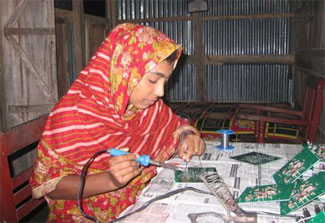When we last wrote about small solar in Bangladesh two years ago, we were really impressed that 1000 systems were being added every day.
One million solar systems powered homes by the end of 2012 and since then Bangladesh has become the world leader in small solar with 2.8 million arrays.
An amazing 2667 solar systems are added each day, with a goal of reaching 5 million by 2015.
Besides bringing electricity to people who haven’t had light, it’s created 114,000 jobs, doubling in the past two years.
That’s how the country got on IRENA’s list of the world’s top renewable energy employers: China, Brazil, US, India, Germany, Spain and Bangladesh.
"Solar energy is not only replacing expensive fuels, it also has become a tool of social change, empowering girls and women," says The World Bank, which provides some of the funding.

This month, the government announced a feed-in tariff for solar to accelerate development more. Individuals will be able to sell energy their solar system generates, but only during daytime, reports Financial Express.
Read our article, Bringing Light to Developing World Left to Small Business.
Solar in Refugee Camps
Meanwhile, the United Nations launched SAFE (Safe Access to Fuel and Energy) this week, to give the millions of people living in refugee camps access to lighting and fuel for cooking.
While these are basic needs, the UN High Commissioner for Refugees (UNHCR) program has yet to fully address them, says Steven Corliss, who directs its Division of Program Support and Management.
Partners include the UN Foundation and the Global Alliance for Clean Cookstoves.
Because of the costs involved, the program is starting with refugee camps in 10 priority countries over the next two years, providing 175,000 families with stoves and another 150,000 with solar-powered lanterns.
They are also installing 2000 solar-powered streetlights to help people feel safe to move around at night.
The countries: Bangladesh, Burkina Faso, Chad, Ethiopia, Jordan, Kenya, Nepal, Rwanda, Sudan and Uganda.
"We can’t do it all alone. But fortunately, because domestic energy lies at the intersection of so many areas of concern … there is a tremendous amount of interest in this strategy, not just internally and not just from the humanitarian world, but also from the private sector and foundations and donor governments who believe this is extremely important," says Corliss.
Read our article, Ingenious Ikea Shelter Could Replace Tents for Refugees.
